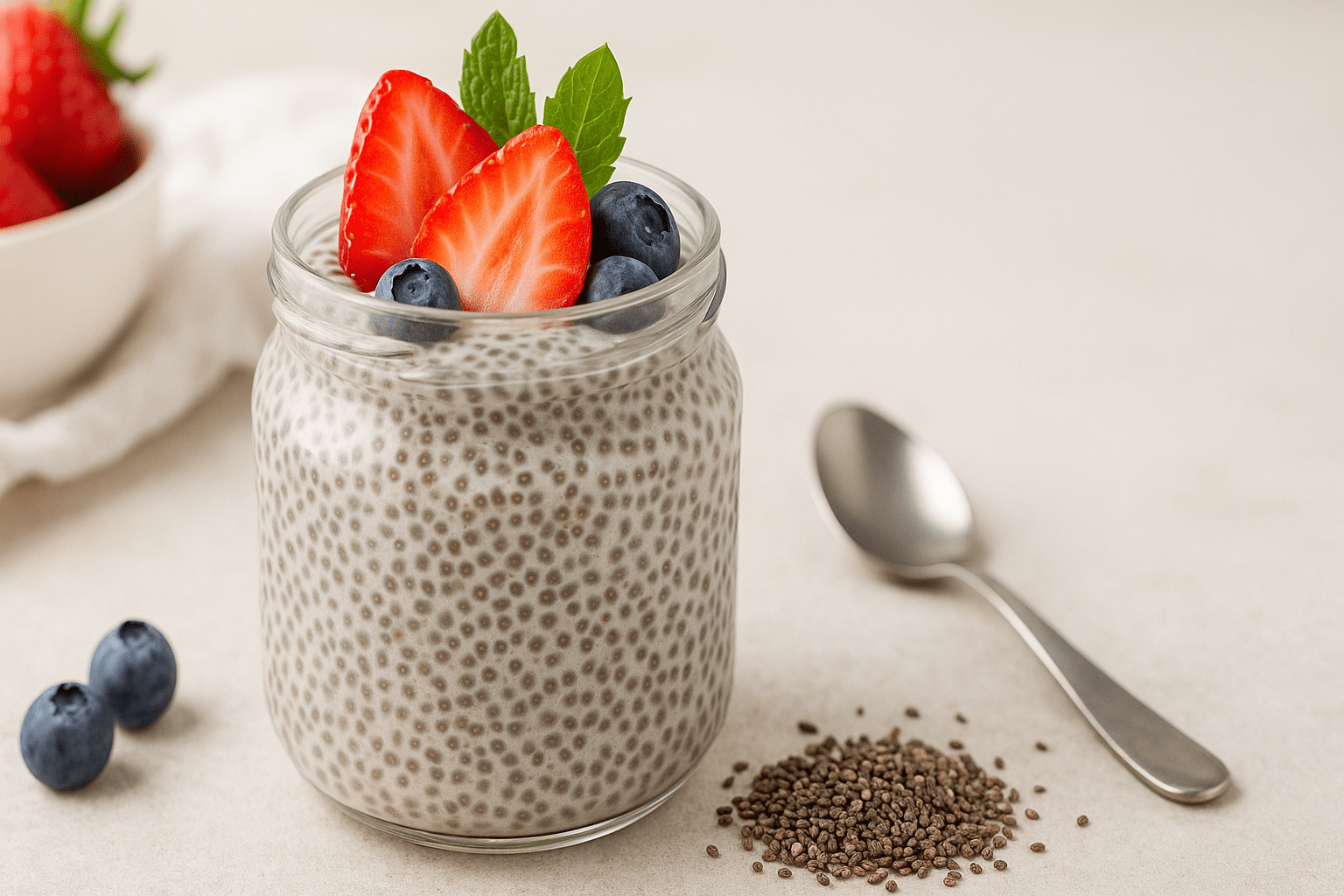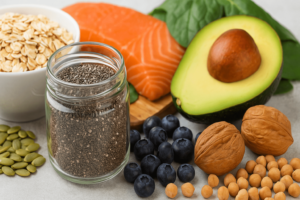7 Ways Chia Seeds Could Boost Your Health And What You Should Know First
Chia seeds have become one of those little miracles you see sprinkled on everything from smoothie bowls to overnight oats. For something so tiny, they sure get a lot of attention. Packed with fibre, omega-3 fatty acids, minerals, and antioxidants, these seeds have earned a solid reputation in the world of wellness. But how much of that praise is deserved, and what should you really know before adding them to your routine?
This article dives deep into chia seeds’ health benefits and the potential ways they can support your body. We’ll explore how they can help with digestion, blood sugar, heart health, and more, along with a few precautions to keep in mind.
How Chia Seeds Work in the Body
Chia seeds might be small, but they act like little nutritional sponges. When you mix them with liquid, they absorb up to 10 times their weight in water, forming a gel-like consistency. That gel is part of the reason they’re so filling and good for digestion. Inside, they’re made up of fibre, plant-based protein, omega-3 fatty acids, calcium, magnesium, and antioxidants.
These nutrients support the body in several ways:
- Fibre keeps your digestive system running smoothly and helps balance blood sugar.
- Omega-3s support the heart and reduce inflammation.
- Antioxidants protect cells from damage.
- Minerals like calcium and magnesium strengthen bones and muscles.
Everything about chia seeds revolves around balance. They don’t work overnight, but when used regularly, they can play a role in helping your body feel and function better.
7 Ways Chia Seeds May Support Health
1. Improve Digestive Health
If your stomach feels sluggish, chia seeds for digestion can help. Their rich fibre content keeps things moving and supports regular bowel habits. When mixed with liquid, chia seeds form a soft gel that helps waste pass more smoothly through your system.
A spoonful in yogurt or smoothies is often enough to feel the difference. Just remember to drink plenty of water; fibre needs hydration to work properly. Start small, about a tablespoon a day, and increase gradually to avoid bloating.
2. Aid Blood Sugar Control and Metabolic Balance
The connection between chia seeds and diabetes management has gained interest in recent years. Chia’s fibre slows down how fast your body digests carbohydrates. That means your blood sugar doesn’t spike as quickly after meals. For people who are watching their glucose levels, that steady release can make meals feel more balanced.
Chia seeds may also improve insulin sensitivity over time, though everyone’s body responds differently. Pairing chia with balanced meals, like oats, fruit, and protein, can help keep energy levels stable throughout the day.
It’s a small, natural way to support your metabolism without making drastic changes.
3. Support Heart and Lipid Health
When it comes to chia seeds’ heart health benefits, their nutrient mix is impressive. They contain alpha-linolenic acid (ALA), a plant form of omega-3 fatty acids known for supporting healthy cholesterol and reducing inflammation.
Here’s what chia may help with:
- Lowering “bad” LDL cholesterol
- Increasing “good” HDL cholesterol
- Supporting blood vessel function
- Helping maintain normal blood pressure
In people with mild hypertension, chia may offer a modest reduction in systolic blood pressure. It’s not a substitute for medication, but as part of a balanced diet, it complements heart-friendly habits like exercise and lower sodium intake.
4. Reduce Inflammation Naturally
Inflammation can quietly affect your energy, joints, and overall health. The antioxidants and omega-3s in chia seeds help calm that process, making chia seeds ‘ anti-inflammatory effects a key reason people include them in their diets.
By fighting oxidative stress, chia supports your body’s natural recovery and helps you feel steadier day to day. It’s not a cure, but when paired with nutrient-rich meals and active habits, it can make a real difference over time.
5. Help with Weight and Appetite Management
If you’ve ever tried to manage your appetite or reduce cravings, chia seeds can lend a hand. When soaked, they swell up, creating a gel that expands in your stomach. That fullness can help you eat less without feeling deprived.
Chia’s fibre slows digestion, meaning your meals keep you satisfied for longer. Combined with a balanced diet, this can support healthy weight maintenance.
Here’s a quick table showing how chia’s properties connect to fullness and weight balance:
Feature | Effect | Why It Matters |
Soluble fibre | Slows digestion | Keeps you feeling full longer |
Protein | Helps retain muscle | Supports metabolism |
Gel-forming ability | Expands in the stomach | Reduces hunger naturally |
It’s a subtle shift, but when used daily, it can help people build more mindful eating habits.
6. Support Bone and Mineral Health
A single ounce of chia seeds provides about 18% of your daily calcium, plus magnesium, phosphorus, and manganese. That’s a lot of mineral power for such a small seed. These nutrients support bone density and strength, making chia a nice addition for people who don’t consume dairy.
The combination of minerals and antioxidants also supports muscles and joints, especially as we age. Just remember that chia seeds should be part of a larger diet that includes whole grains, vegetables, and other calcium-rich foods.
7. Possibly Aid Blood Pressure and Cholesterol Balance
There’s growing evidence that regular chia intake can help regulate both blood pressure and cholesterol levels. The fibre binds to cholesterol in the gut, helping to remove it from the body before it’s absorbed. Meanwhile, omega-3s contribute to smoother blood flow.
It’s not a miracle fix, but it’s one of those everyday habits that add up. Pairing chia with other heart-healthy foods like avocados, nuts, and olive oil can create a powerful combination for long-term cardiovascular wellness.
What to Know Before You Try, Risks, Safe Use, and Considerations
Safe Dosage and Typical Serving
Most experts recommend between one and two tablespoons per day, which equals about 15–30 grams. Start small and work your way up. Jumping straight into high doses might cause bloating or discomfort, especially if you’re not used to high-fibre foods.
You can add chia to smoothies, puddings, yogurt, soups, or even baked goods. Soaking them before eating helps reduce the risk of choking and makes them easier to digest.
Side Effects and Interactions
Let’s talk about chia seeds and their side effects for a moment. While uncommon, some people experience gas, bloating, or diarrhea when they eat too much too soon. Eating them dry without enough liquid can cause them to swell in your throat, which might be uncomfortable or dangerous.
There’s also a chance that chia could interact with certain medications, especially those for blood pressure or diabetes. If you’re on medication, it’s always smart to check with your doctor before making chia a daily habit.
Potential Concern | What Can Happen | How to Avoid It |
Too much fibre | Bloating, gas | Increase gradually |
Dry chia seeds | Throat discomfort | Always soak first |
Medication interaction | Blood thinning or low sugar | Consult your doctor |
How to Prepare and Use Chia Seeds
Chia seeds are flexible and fun to use once you know how to handle them. The key is moisture. They expand, so you want to give them room to soak and soften.
Simple ways to use them include:
- Stir into overnight oats or yogurt.
- Blend into smoothies.
- Mix with water or milk to make chia pudding.
- Sprinkle on salads for extra crunch.
Keep them in an airtight container, away from sunlight. They last a long time, but freshness matters for taste and nutrition.
Tips to Get the Most from Chia Seeds
Think of chia as a support player, not the star of the show. Here are a few tips to make the most of them:
- Rotate your fibre sources. Add flaxseeds, oats, and fruits for variety.
- Combine chia with colourful plant foods for stronger antioxidant effects.
- Drink plenty of water to keep digestion smooth.
- Stay consistent. Benefits build up over time, not overnight.
- Keep expectations realistic. Chia supports a healthy lifestyle, but it doesn’t replace it.
Conclusion
Chia seeds might be small, but their benefits go a long way. From better digestion and heart support to balanced blood sugar and inflammation control, the chia seeds’ health benefits can quietly strengthen your overall wellness.
For a deeper approach to long-term health and energy, take a look at our Longevity Program, a guided way to build lasting habits that support your body and mind every day.


